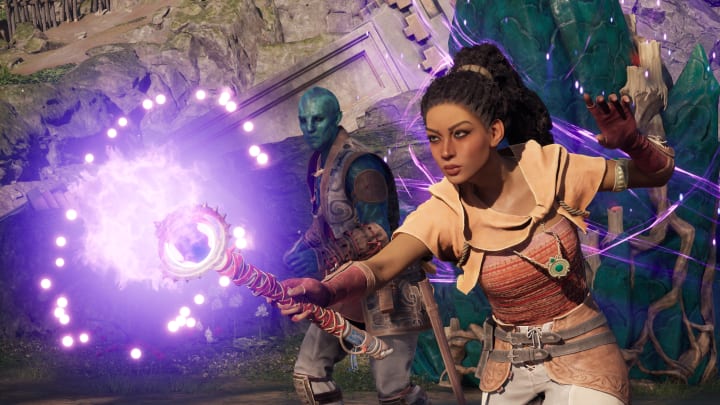Avowed has secret quests with big choices – “it relies on players being curious” and following leads

During Summer Game Fest, we got a deeper look at Avowed, the next fantasy RPG from Obsidian Entertainment. The short trailer focused on the story and how you can shape it, casting you as an envoy for the Empire sent to a far-flung and “untamed” land to investigate the outbreak of some magical disease - a spiritual corruption called the Dreamscourge.
Though Avowed is set within the Pillars of Eternity universe, there’s a sense that Obsidian is distancing itself from these previous games by escorting them to a new landmass outside of the influence of your big decisions.
Exploring a new location allows the developers to flesh out returning characters like Inquisitor Lödwyn without alienating the new audience, who jumped on board because they were encouraged by this fresh perspective – both as a stranger in a strange world and as a first-person RPG in a universe we usually see from a bird’s-eye view.
“Deadfire players will recognize some references, like the dwindling existence of the godlikes, without us going too deep into it and making it feel like required reading for new players,” game director Carrie Patel explains.
From a development standpoint, it’s a smart decision. Building an entirely new fantasy world is a lot of work, coming up with concepts, races, monsters, religions, political beliefs, histories, and more. Avowed allows Obsidian to explore the rich lore of Pillars from a new angle.
“We love the world we created for Pillars and Deadfire,” Patel says. “There’s a lot to explore in terms of regions where we haven’t set content, themes, characters, and ideas.”
Deadfire explored the impact of colonialism on cultures, and Avowed takes a similar route, examining the idea of order and chaos through the lens of the player character. As an envoy to the Empire, you’re an agent of ‘order’, but whether you wish to be their puppet or help the people of the Living Lands is completely up to you.
“As in previous Pillars games, there’s that political story, and then underneath that, there’s a metaphysical story about The Divine, about mysteries, about long-standing secrets and how those have affected the development of life in the region,” Patel explains.
Avowed isn’t just close to Deadfire in terms of themes – it’s also similar in tone. Where Pillars of Eternity was grimdark and unrelenting, Avowed, like Deadfire, will balance its high-stakes story with moments of levity. Side quests and characters bring humanity.
The setup, with you playing as an agent of an authoritarian regime, reminds me of another Obsidian game, Tyranny, in which you work for an evil overlord who’s already conquered the world. Patel tells me this is a result of Obsidian’s penchant for exploring moral complexities.
“We enjoy exploring morally gray themes, territory, and complicated questions that force the player to engage and choose an answer without giving easy answers,” she explains. “We wanted to avoid the idea of this very black and white, good and evil monolithic Empire versus everybody else who was really nice, and then create a situation that feels believably complex.”
Obsidian believes that difficult choices force you to adapt on the fly, actually roleplaying your character instead of deciding on the character creation screen exactly who you’ll be – there’s no Renegade or Paragon binary morality here. While the dialogue mechanics don’t lift the disposition system from Pillars of Eternity, Obsidian worked hard to ensure there’s a response for as many character archetypes as possible for each situation.
“The best moment when you’re playing is when you come to a [dialogue] tree, there are several options, and they’re all fun and laden with personality,” Patel says. “And maybe they have some humor behind them, or some real bite and force.”
Being a classless game where you can switch and change your playstyle on the fly, Obsidian wanted to reflect that in your conversation options, giving you the freedom to be malleable. There are certain archetypes you can choose in the character creator – mage scholar, warrior, war hero, etc. – but these function as an extra option in specific conversations as a reflection of your early choices.
The best point of reference for the range of options is another Obsidian game, The Outer Worlds. Avowed won’t be quite as expansive as Pillars of Eternity because moving to this new perspective makes animating and framing conversations important and costly. Like The Outer Worlds, it’ll still be deeper than the simple mood-based radial menus of some modern RPGs, and because of the new perspective and focus on immediacy, not all of your choices will be dictated by words alone.
“We have choices where you can choose to start the fight,” gameplay director Gabe Paramo explains. “Or maybe I’m gonna say something that p****d this character off, and the group will jump me. Or maybe I’ll use money to get through the scenario in a cleaner way or use some of my attributes.”
“We’ve got one that I always want to be very careful in how I talk about it because it’s a player-led discovery,” Patel adds. “There is something you can find if you go looking for it. You can make a very meaningful choice about whether to prevent something. But it relies on the player being curious, investigating their surroundings, and following these leads, but they’re not given to them as quest objectives.”
That freedom to explore, be curious, and carve your own path through Avowed has its limits. One thing you won’t be able to do is murder everyone. Unlike in many other Obsidian games – some of which Patel has worked on – quest-critical characters can’t be killed in Avowed.
“We decided to forego the murder hobo playstyle,” Patel explains. Designing a game to fit around the possibility of a psychopathic rampage, as with adding anything in a game, comes with a series of design challenges.
“Often it’s something that people do accidentally, which means you can’t put combat in a crowded space because one stray fireball can aggro the whole town,” she continues. “Or it’s something that they do just for fun. I don’t want to discount the value of that, but I also see how many things we have to forego on the dev side to support it.”
It’s similar reasoning for why you won’t be able to romance your companions, despite them being a big focus of the game – whether you’re out in the field and listening to them banter or back at camp putting the world to rights. Obsidian wanted to focus on this aspect – ensuring they have strong character moments and good arcs – instead of pouring development time into a quick fade to black smooch scene.
It remains to be seen how this more streamlined approach is received by the modern audience, who seem to be crying out for complexity, depth, and bear coitus if the sales success of Baldur’s Gate 3 is anything to go by. But I’m confident that Obsidian has a story worth telling, hard choices for you to make, and a fleshed-out world to explore. While Avowed seems to be removing some of the complexity from Obsidian’s other RPGs, it also feels like a culmination of all the studio’s ideas up to this point in the same way Baldur’s Gate 3 did to Larian. The jury’s out on whether it can replicate the same success without letting you romance a sexy vampire, but I’m looking forward to seeing for myself.
